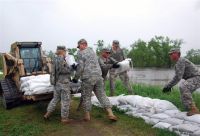ARLINGTON, Va., June 21, 2011 — About 2,000 National Guard members from nine states are continuing relief operations in the wake of the 2011 Midwest floods, which have ravaged thousands of acres and potentially caused billions of dollars in damage, National Guard officials said today.
Guard members from Arkansas, Iowa, Kansas, Louisiana, Missouri, Nebraska, North Dakota, South Dakota and Wyoming have been working tirelessly, some for about three months, to protect their states and citizens from the devastation of rising rivers.
The Arkansas Army National Guard is providing soldiers to the Joint Operations Center and as well as interagency liaison officers for better command and control. In Iowa, where the Missouri River has caused the shutdown of much of Interstate 29 in the western part of the state, the National Guard has been evacuating citizens and patrolling levees in multiple counties.
Due to the June 13 rupture of a primary levee on the Iowa-Missouri border Iowa Guard members working with the Army Corps of Engineers on June 15 built a secondary levee to protect the southwest Iowa community of Hamburg from an overflow of the Missouri River.
Kansas Guard members are continuing to patrol threatened levees, monitoring them for potential weakness from the pressure of the rising Missouri River waters.
Guard members from Louisiana are performing levee patrols and area security, providing aviation support and resource transportation for critical areas affected by the flooding.
With seven counties heavily affected by the floods, Missouri National Guard members are providing liaison officers and have been moving non-mission-essential equipment to Forbes Field in Topeka, Kan., in preparation for a potential relocation of Rosecrans Air National Guard Base.
Nebraska Guard members are providing levee monitoring for the city of Omaha and have prepared generators in the event they are needed for critical areas.
North Dakota Guard members are still running 24-hour operations. They are providing quick response forces and ground search and rescue teams to multiple counties throughout the state.
North Dakota Army National Guard UH-60 Black Hawk helicopters with hoist capabilities also are being used to place one-ton sandbags along weakened levees.
In South Dakota, Guard members are providing air assets for sandbagging efforts and personnel transportation. They have deployed a Joint Incident Site Communications Capability team and more than 100 hand-held radios to increase communication throughout the state.
The Wyoming National Guard has activated its emergency operations center while performing flood mitigation in several counties.
The Guard also is in full swing for the annual hurricane season, but will continue its current operations both at home and abroad, the chief of the National Guard Bureau said.
“Your National Guard has been fully engaged in the war fight overseas, and we also stand ready to answer the call domestically when a disaster happens,” Air Force Gen. Craig R. McKinley said.
Source:
U.S. Department of Defense
Office of the Assistant Secretary of Defense (Public Affairs)

 von
von 
